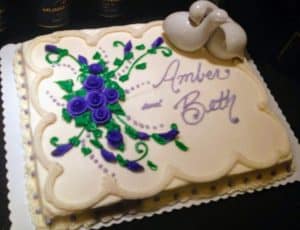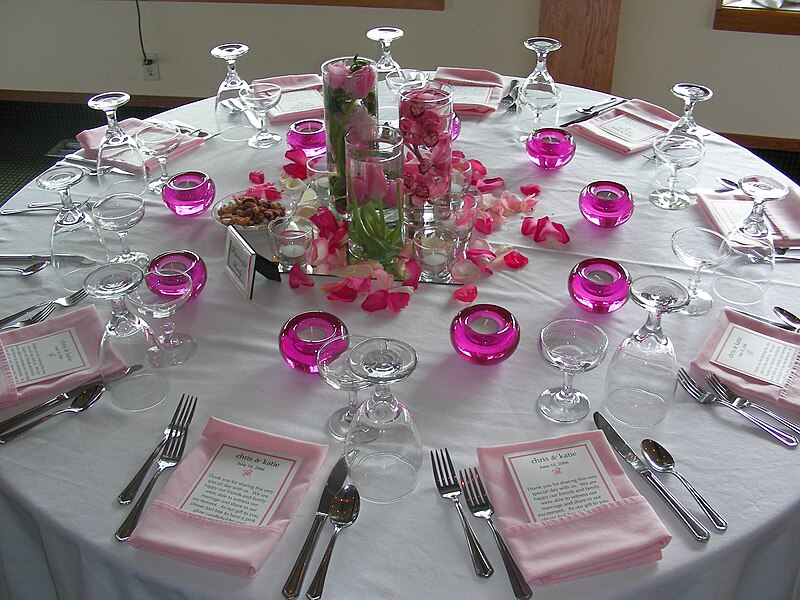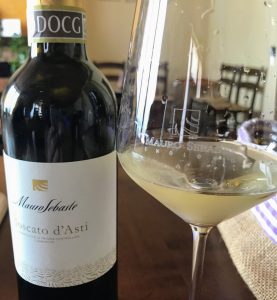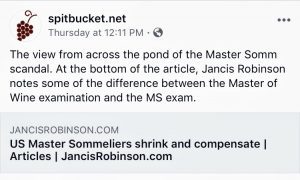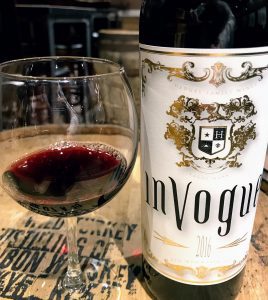The wine world was rocked when the Court of Master Sommeliers announced this week that they were invalidating the results from the tasting portion of this year’s MS Exam. The Court found evidence that details about the blind tasting wines were divulged by a proctoring Master Sommelier. The fallout meant that 23 of the 24 new Master Sommeliers would have to retake the tasting portion. Only one new Master Sommelier, Morgan Harris who passed tasting the year before and just needed to pass service, kept his pin.

When I wrote my post It’s Raining Masters about the shock over the huge number of new Master Sommeliers, I never expected this.
My first thought was that maybe the was getting “relatively” easier. At least, compared to the “wine savvy” of today’s somms and consumers . I say “relatively” easier because I sure and the heck couldn’t pass it. But it made sense that more people were taking and passing the exam because we are in a sort of “golden age” of wine knowledge right now. Just compare what the average wine enthusiast, much less the average sommelier, knows about wine today to what they did 30 or even 50 years ago.
But for the Master Somm exam, cheating never once crossed my mind. That may have been naive. This is likely not the first time it has happened. Anything worth attaining will be worth, in someone’s mind, risking it all to get.
Even if the collateral damage is devastating.
Updates
Update: WineSearcher.com posted a letter from the partner of one of the MS candidates impacted by the scandal. This letter includes another detail about how exactly the cheating may have occurred. I’ve added this new detail underneath the How Did the Court Find Out? section.
Update Part II: WineSearcher.com posted another great scoop October 24th about the fallout after the Court first announced the scandal. I’ve included a link and more details underneath the Who Did It? section.
Update Part III: On December 5th, the first of the 3 potential make up exams for the blind tasting portion was held in St. Louis. The results were released the next day and 6 of the 23 impacted candidates got their Master Sommelier certifications back. Their names are posted in the What’s Next? section.
Update Part IV: As we’re nearing the 1 year anniversary of the scandal, Newsy’s Uncorked did an investigation into the fall-out of the Court’s decision which includes exclusive interviews from two of the impacted candidates. The video is posted in a new Aftermath section down below.
Why Is This A Big Deal?
Until this year, only 274 people were Master Sommeliers. Popularized by the movie Somm, the amount of time, work and dedication required to take and pass the exam earned a mythos around the title.
Along with the Master of Wine exam, this is the pinnacle of the wine world. If you wanted to challenge yourself–if you wanted to be the best of the best–this was your goal.
But I think the most newsworthy part of this story is not the cheating (which, again, would be naive to assume doesn’t happen) but rather the dramatic move by the Court to invalidate the results and upend the lives of 23 people. Despite having evidence of which Master Sommelier led the cheating, they apparently don’t know who benefited from it. Undoubtedly, the collateral damage includes innocent people.
Reading their stories is heartbreaking.
Several of the impacted candidates have shared their personal pain in private discussion groups like the GuildSomm discussion board (open to members only). Wine Spectator highlights one of those stories in an October 10th article.
“As a member of the first class in the Court’s illustrious history to be named, and subsequently, have an asterisk drawn next to the title we sacrificed so much to obtain, I offer a very earnest and valid question: What now? … What do I say to my employer who extended new benefits and responsibilities?” wrote Christopher Ramelb, one of the candidates and an employee of Southern Glazer’s Wine & Spirits, on the online message board for wine-education organization GuildSomm. “I feel so stupid and lost, as if the years of preparation and discipline, the stress of performing, and the jubilation of finally doing so, have been for nothing.” Wine Spectator, October 10th, 2018
In interviews given to the media, several candidates talked about the personal and financial toil (including tens of thousands of dollars) that studying for the exam has.
Now they have to do it all over again.
How Did the Court Find Out?
Frances Dinkelspiel of the Daily Beast reported that a lawyer contacted the Court of Master Sommeliers about impropriety that occurred during the last testing session. Neither the article nor the Court have divulged who the lawyer represented.
In the same Daily Beast article, Morgan Harris speculated that “Whoever was cheating must have confessed,”. If this was the case, then why are the other 22 (?) or so still under scrutiny?
Update
In his October 19th article “Somm Scandal: A Question of Integrity”, Don Kavanagh of WineSearcher.com posted a letter by Cameron Pilkey whose partner (Dan Pilkey?) was one of the 23 MS candidates impacted.
The letter included a very interesting detail about how the cheating may have occurred.
A member of the Board, the very same governing body that has made this decision, sent an email to a few select candidates the morning of the tasting portion of the exam with the subject line “heads up”, releasing the initials of two varietals in the flight. — Cameron Pilkey via WineSearcher.com
This letter seems to confirm the rumors that an email from the offending Master Sommelier was the avenue of the cheating. But it still hasn’t been released who or how many candidates received the email–though the plural indicates likely more than one recipient.
The detail of initials is also interesting to ponder. While the testable wines for the Master Sommelier exam is not public, Guild Somm has published a list of Probable Red and White wines for the Advance Sommelier exam. While not definitive, these lists are good starting points.
So what could the “helpful” initials have been?
CS, CF, PN?
CB, GV, PG, SB?
Speaking for myself, I often get in trouble with Cabernet Franc, Chenin blanc and Pinot gris with blind tasting. Knowing if any of those varieties were in the flight would have been of immense help.
Who Did It?
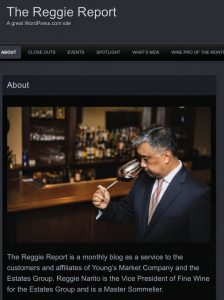
Screen shot from Reggie Narito’s public blog.
https://rnarito.wordpress.com/
The Court has not named the offending Master Sommelier–likely for legal reasons. Don Kavanagh and Robert Myers of WineSearcher.com believed they’ve uncovered it by comparing lists of current Master Sommeliers and noting that one sommelier–Regino “Reggie” Narito Jr.–has been removed from the Court’s membership roles.
It would be unfair to speculate beyond what has been publicly posted but reading Narito’s last blog entry from September 26th, 2018 only highlights the collateral damage of this scandal. Here he speaks of the journey, hardships and many failed attempts of 3 of the successful candidates who had their titles now stripped from them.
The story of Christopher Ramelb (previously quoted by Wine Spectator above) in particular really got me.
A soft spoken and deferential personality, he shuns the spotlight preferring to sit contently in the background while others bask in the spotlight. As his proctor for both the theory and tasting portions of his exam, his skill and professionalism really stood out for me and I was proud to be the one to present the good news of his passing. Upon hearing the news, it was not surprising to see him get very emotional, but it was for a different reason-he revealed to me that he lost his father on Christmas Eve last year and for over 9 months, he bottled up his emotions so he could give this exam a serious go. With the revelation that the test was now behind him, he began to cry uncontrollably, crumpling to his knees and sobbing, “I miss my dad so much”. — Reggie Narito, 9/26/2018
Update
Liza B. Zimmerman of WineSearcher.com interviewed a Master Sommelier about the scandal off the record but was able to publish some interesting details about what happened after the Court of Master Sommeliers announced the scandal on October 9th.
On October 10th, one of the impacted MS candidates, Justin Timset, sent a later to the Court. In it he names Reggie Narito as the MS who “broke the Court’s code of ethics”. This was a day before WineSearcher.com released their article speculating that Narito was the disgraced MS.
Zimmerman’s article also notes that Narito’s then-employer, the distributor Young’s Market Company, only public comment on the scandal is to note that Narito’s Linkedin profile no longer list Young’s his place of employment. However, that maybe a duplicate or fake profile since another LinkedIn profile featuring the same picture that Narito uses on his blog still list VP of Fine Wine at Youngs Market Company as present employment.
Distributors’ Involvement?
The latest WineSearcher.com articles goes into the complex and murky influences that distributors may have on the MS exam. Zimmerman quotes her inside source claiming that “The court has been infiltrated by distributors’ interest”.
He added that through the long process of mentoring a handful of students, wholesalers are also likely to do more than just taste with their hand-picked protégées. The relationship is likely to also have included expensive meals and other treats which can be put on the wholesalers’ expense accounts to curry favor with promising sommeliers who are also their customers.
Seeing your favorite handful of wine buyers through the difficult process of studying for the exam, and then having them successfully pass, makes these wholesalers look like superstars in the eyes of their employers. — Liza B. Zimmerman, WineSearcher.com 10/24/2018
What’s Next?
A few days ago, the Court of Master Sommeliers released their plans for retesting those impacted by the scandal. First, the candidates who both passed and failed the tasting exam will have their exam fee refunded. Additionally, they will see their resitting fees waived as well. The Court will offer 3 opportunities over the course of the next year to retake the exam. Some candidates will receive travel assistance as well.
Many of the 23 people who passed tasting this year are not going to pass again–even if they deserve to. Spago Sommelier Cristie Norman gives a great analogy that sums up almost what a crapshoot blind tasting really is. So much of blind tasting is mental. These candidates are going to have an even bigger burden on their shoulders than they did at the first exam.
Approaching the blind tasting portion of the exam is like training for the Olympics: You have to be in shape. There are plenty of people who have passed tasting once and not been able to again. It depends on the time of day, your hormones, the humidity, even the altitude. When the exam was held in Aspen one year, multiple candidates complained that the change in elevation was affecting the way they tasted. Being asked to retest with your masters reputation on the line in conjunction with the sheer difficulty of the exam sounds like any wine professional’s nightmare. — Cristie Norman, Eater Magazine October 12th, 2018
Failing the retake will unfairly associate the candidates even more with the scandal. This is why it’s important to release the names of the cheaters.
Update
The first of the 3 make up exams has happened. All together 30 of the 54 individuals who took the tainted September exams resat for this round. While I haven’t be able to find out exactly how many of the 23 impacted candidates were part of this exam, it was announced on December 6 that six candidates passed.
Dana Gaiser of Lauber Imports in New York City, NY
Andrey Ivanov of Bliss Wine Imports in San Francisco, CA
Maximilian Kast of Broadbent Selections in Chapel Hill, NC
Douglas Kim of Picasso Las Vegas, NV
Steven McDonald of Pappas Brothers Steakhouse in Houston, TX
Mia Van de Water of Eleven Madison Park in New York City, NY
All six newly minted Master Sommeliers were among the 23 candidates impacted by this recent scandal.
Another Option?
It’s not surprising that most of the candidates are balking at the Court’s offer and “fighting back” in a letter shared with the Chicago Tribune.
Signed by 19 of the 23 impacted candidates, the letter calls for a full investigation into the individuals responsible. Instead of making everyone retake the exam, the Court should seek exoneration of the innocent candidates. The Court’s actions “…effectively exonerates the guilty parties, and at the very least rewards their lack of moral courage.”
The Chicago Tribune doesn’t note who signed the letter–outside of naming Chicago-area candidates Jill Zimorski and Dan Pilkey. Nor does the Tribune divulged the 4 candidates whose names were absent.
Aftermath
Almost a year later, there are still lots of unanswered questions about the scandal. More of the impacted candidates have begun to speak out including Australian sommelier Jane Lopes who wrote a deeply personal op-ed about the toll that the scandal took on her and why she decided not to resit.
Jill Zimorski and Dan Pilkey also sat down for exclusive interviews with Newsy’s Uncorked to share their side of the story as well as the shocking lack of follow up by the Court of Master Sommeliers.
Threads to Follow
Even though media outlets have been quoting comments from impacted candidates shared on the GuildSomm discussion boards, I would encourage interested readers to consider joining GuildSomm as a member to access the forums legitimately. Far beyond this scandal, GuildSomm membership offers numerous other benefits. From classes to articles, maps, tasting kit discounts and more–it’s worth wine geeks looking into.
Many members of the wine industry frequent the Wine Beserkers forum. While you should always be cautious about what is posted online, their discussion thread on the topic does at least provide another perspective.
Reddit’s r/Wine community also has had several threads on the scandal. However, given the more anonymous nature of Reddit, I would urge more caution in taking what you’ve read at facevalue.
SpitBucket’s Facebook page. Apart from the blog, I use SpitBucket’s Facebook page as a curated news feed. Here I post articles and blogs that I’m reading. I’ve been posting a lot of articles about this scandal and will post more as new details emerge.




